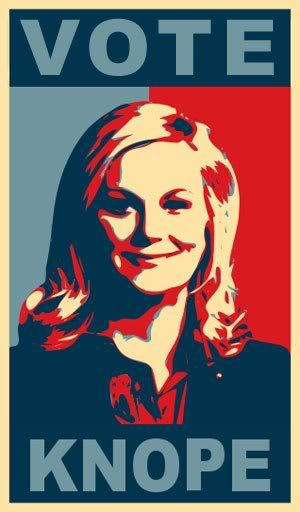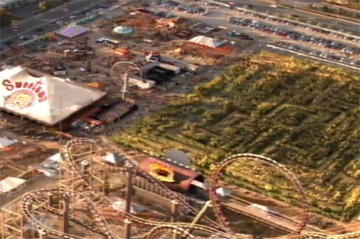 I've been re-reading Bruno Latour's Aramis and re-watching Parks and Recreation. Shot in the documentary style of The Office, the show increasingly strikes me as a performance of what Latour describes in Aramis as a "relativist sociology": "It does not know that society is composed of, and that is why it goes off to learn from others, from those who are constructing society" (200). Parks and Recreation is a portrait of government in action. Leslie Knope, of the Love of Local Government.
I've been re-reading Bruno Latour's Aramis and re-watching Parks and Recreation. Shot in the documentary style of The Office, the show increasingly strikes me as a performance of what Latour describes in Aramis as a "relativist sociology": "It does not know that society is composed of, and that is why it goes off to learn from others, from those who are constructing society" (200). Parks and Recreation is a portrait of government in action. Leslie Knope, of the Love of Local Government.The show, at its finest, performs the work of negotiation and compromise that, in part, shapes civic life. In re-watching these moments with Aramis by my side, I can't help but see Leslie through Latour's eyes:
Bureaucrats are the Einsteins of society. They make incommensurable frames of reference once again commensurable and translatable. The protocol of agreement, red-penciled and ratified, starts moving again, going from one reference body to another, tracing a path along the way, a succession of fragile catwalks that make the agreement harder to break each time, because it is now weighed down with the word of the State.
 |
| Final shot of "Harvest Festival" |
I'll grant anyone, for the moment, any joke or insult about civil servants and bureaucrats. Yes, yes. But I ask, in light of the kind of sociology that Latour proposes, what does such a view, nearly ubiquitous outside of Parks and Recreation, get us? How do we benefit from demeaning such work (other than getting exactly what we deserve)? How do we learn to do it better by dismissing it out of hand? In rushing to judgement, we glass over the decided-ness of what we hold near and dear. We short-circuit democracy.
I'd argue that lurking beneath such a short-circuiting contempt is what Latour calls "classical sociology":
There are norms, and thus there are deviations with respect to the norm; there are reasons, and thus there is irrationality; there is logic, thus there is illogicality; there is common sense, and thus perverted senses; there are norms, and thus there are abnormality and anomie. (199)When I watch Parks and Recreation I am not watching a documentary where "the actors are informants," telling what they did so that we can pass judgement (although certainly this happens: I can easily imagine a classical sociological viewing of the show). For me, I am watching government in action. Parks and Recreation is not a show where common sense, and logic, and reason are outside measures applied to political behavior; it is, at its best, a show where common sense, logic, and reason are all the end results--the effect--of political behavior. For instance, the reasonableness of the park Leslie wants to put in the vacant lot (this is the primary arc of season one) cannot be known ahead time: its reasonable-ness, its sensical-ness, its feasible and, finally, its reality are precisely what is being worked on. To borrow from Latour, things like logic and common sense "follow; they do not lead. They are decided; they are not what makes it possible to decide" (184).
As Leslie says of her first public forum (which goes terrible and to great humorous effect): "God I loved it. I loved every minute of it!"
"But I ask, in light of the kind of sociology that Latour proposes, what does such a view, nearly ubiquitous outside of Parks and Recreation, get us? How do we benefit from demeaning such work (other than getting exactly what we deserve)? How do we learn to do it better by dismissing it out of hand?"
ReplyDeleteReally? You can't even imagine what would Ron Swanson say?
;)
ReplyDeleteRon, in terms of the show as relativist sociology, is rather important. Latour might argue that Ron attempts to make government less real. As Leslie works to assemble, Ron works to disassemble. Ron is certainly not an unlikeable character: we can't easily read the show as dismissive of his views.
ReplyDeleteThe irony I guess, is that Ron's antigovernment views are part and parcel of the shape of government. We'll leave aside for now the question of his own government job, which Leslie does for him, as well as his government benefits, and future government pension.
(Also, @Nick_Offerman is real and it's live.)